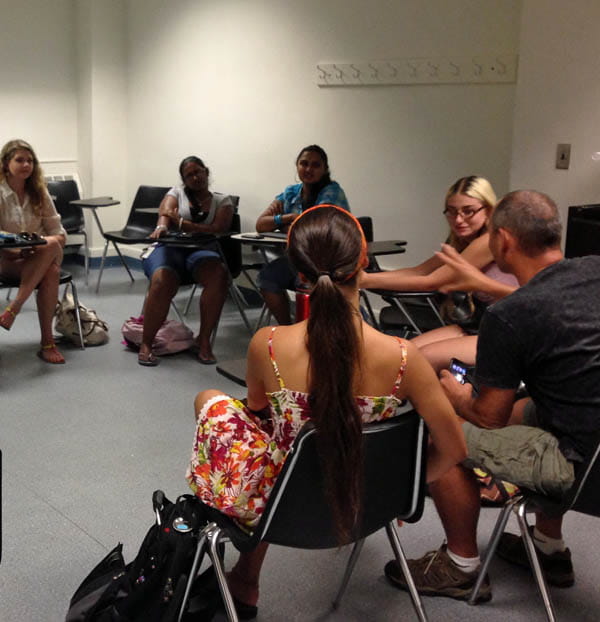Drexel students Erica Tuttle (left) and Saadiya Ali (middle) meet weekly with Nancy Manion (right) at her home to write a life journal about her husband, John, a hospice patient who passed away in July.
With his fists up in a boxer’s stance, Thomas “Tommy” Jamison said of his contemporary in the boxing world, “They called him Sugar Ray because he was sweet, his moves were sweet!”
Jamison is a 75-year-old hospice patient in West Philadelphia who now spends his Tuesdays reliving his glory days as a former boxer and ladies’ man while Hannah Gittler furiously writes it all down. Gittler, a sophomore English major in Drexel University’s College of Arts and Sciences, is interviewing Jamison for a creative writing class. “He still has the heart of a fighter,” she said.
The class, entitled “A Beautiful Life,” is a community-based learning course in the Department of English & Philosophy which pairs students with a patient in an area hospice or home to pen a “life journal” that will chronicle the patient’s life experiences for their family and loved ones.
Taught by Kenneth Bingham, a teaching professor of English, the 11 students range in areas of study from biology to English, film, nursing and psychology.

The class meets back at Drexel every
Tuesday to share stories and discuss
experiences |
The group meets on campus every Tuesday morning to share their experiences and discuss challenges. In addition to the life journals, some students have opted to augment their stories with scrapbooks, film and other projects.
"The experience of facing death and dying is as important for those pursuing careers in creative fields like writing or film as those going into the medical field,” said Bingham. “Many people are scared of death. But the last days of someone’s life are really a time to celebrate that life. This experience shows the patients that what they’ve done really matters, and students learn how much their own lives matter as well.”
The life journal program is coordinated through Crossroads Hospice, which recruits volunteers from the community to meet with patients and compile the journals.
According to Gloria Allon, executive director of Crossroads, “Creating a life journal allows the patient to talk about their life – their first love, their greatest accomplishment – because we believe hospice isn’t about dying, it’s about celebrating the life you’ve lived.”
Hospice isn’t about dying, it’s about celebrating the life you’ve lived.
Crossroads compiles the stories and photos into a complimentary hardcover book which they give to the patients’ family and friends.
Erica Tuttle and Saadiya Ali, both biology majors who plan to go into the medical field, had an especially challenging experience, as the patient they were assigned to, John Manion, passed away prior to their first meeting.
However, Manion’s 76-year-old wife Nancy Manion decided to participate in the project herself. Manion told the students, who meet with her weekly at her home in Bensalem, Pa., that their visits give her a reason to get up every day and the journal allows her to focus on the joy of her husband’s life and not just the sadness of his death.
Another student pair, Michelle Nocito, a financial advisor who is pursuing a degree in psychology, and Judith Parent, a nursing major, have been meeting weekly with Carmine “Tom” Barbieri, a 98-year-old man whose family lost everything in the Great Depression, including their Philadelphia home where he grew up with his 8 siblings, a driver, a cook and a maid.
Nocito is inspired by the joy and excitement that Barbieri still finds in everyday life, despite all that he’s been through. “As he’s talking with us, you can see the recall happening,” she said. “He goes to another place – it must be nice to go back there. We never want to interrupt him.”
The students will present their final journals and projects to the families and friends of the patients during finals week.